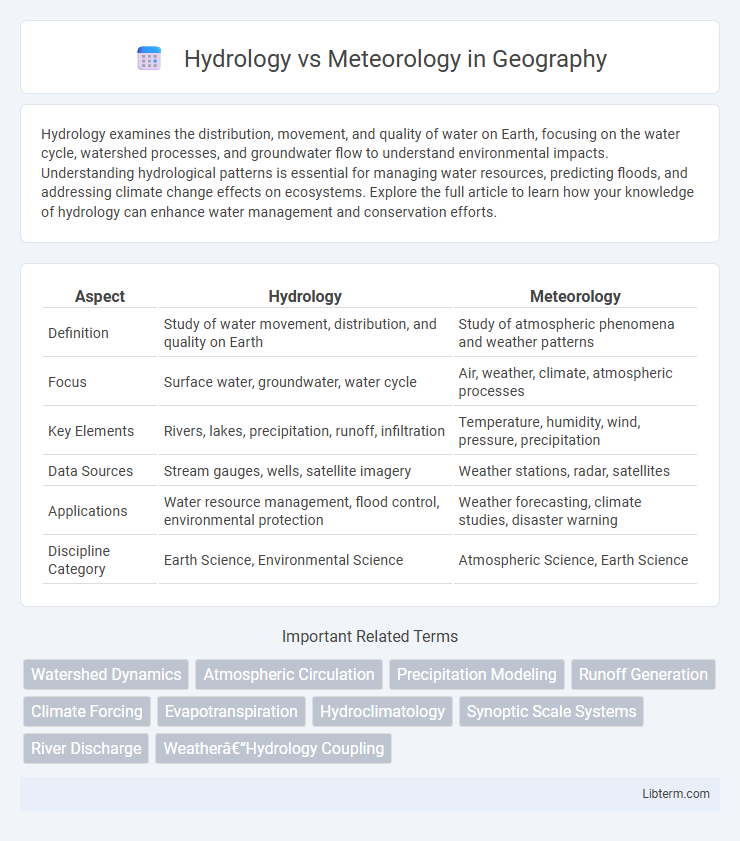Hydrology examines the distribution, movement, and quality of water on Earth, focusing on the water cycle, watershed processes, and groundwater flow to understand environmental impacts. Understanding hydrological patterns is essential for managing water resources, predicting floods, and addressing climate change effects on ecosystems. Explore the full article to learn how your knowledge of hydrology can enhance water management and conservation efforts.
Table of Comparison
| Aspect | Hydrology | Meteorology |
|---|---|---|
| Definition | Study of water movement, distribution, and quality on Earth | Study of atmospheric phenomena and weather patterns |
| Focus | Surface water, groundwater, water cycle | Air, weather, climate, atmospheric processes |
| Key Elements | Rivers, lakes, precipitation, runoff, infiltration | Temperature, humidity, wind, pressure, precipitation |
| Data Sources | Stream gauges, wells, satellite imagery | Weather stations, radar, satellites |
| Applications | Water resource management, flood control, environmental protection | Weather forecasting, climate studies, disaster warning |
| Discipline Category | Earth Science, Environmental Science | Atmospheric Science, Earth Science |
Introduction to Hydrology and Meteorology
Hydrology studies the movement, distribution, and quality of water on Earth, including surface water, groundwater, and precipitation, focusing on the water cycle and its impact on ecosystems. Meteorology examines atmospheric processes and weather patterns by analyzing air pressure, temperature, humidity, and wind, aiming to forecast weather and understand climate dynamics. Both disciplines are interconnected, with hydrology relying on meteorological data to predict water availability and flood risks.
Defining Hydrology: Scope and Focus
Hydrology is the scientific study of the movement, distribution, and quality of water on Earth, encompassing surface water, groundwater, and precipitation processes. Its scope includes analyzing water cycles, watershed management, and water resources sustainability to address issues like flooding, droughts, and water pollution. Unlike meteorology, which focuses on atmospheric phenomena and weather patterns, hydrology centers on water systems and their interactions with the environment.
Understanding Meteorology: Key Areas
Meteorology focuses on atmospheric processes including weather patterns, climate dynamics, and the interactions of air masses, temperature, humidity, and pressure systems. Key areas involve forecasting weather, studying atmospheric phenomena, and analyzing the impact of weather on ecosystems and human activities. Advanced meteorological models use satellite data and computer simulations to predict storms, precipitation, and long-term climate changes with increasing accuracy.
The Core Differences Between Hydrology and Meteorology
Hydrology focuses on the study of water movement, distribution, and quality within the Earth's surface and subsurface, analyzing rivers, groundwater, and watersheds. Meteorology concentrates on atmospheric phenomena, examining weather patterns, climate, and atmospheric processes that influence temperature, precipitation, and wind. The core difference lies in hydrology's emphasis on the water cycle and terrestrial water systems, while meteorology centers on atmospheric dynamics and weather forecasting.
Tools and Techniques Used in Hydrology
Hydrology relies on tools such as stream gauges, soil moisture sensors, and remote sensing technologies to monitor water flow, groundwater levels, and precipitation patterns. Techniques like hydrological modeling, geographic information systems (GIS), and isotope tracing help analyze water cycle components and predict flood risks. These specialized instruments and methods distinguish hydrology from meteorology's focus on atmospheric measurements and weather forecasting tools.
Meteorological Instruments and Methods
Meteorological instruments such as anemometers, barometers, hygrometers, and weather radars are essential tools for measuring atmospheric conditions including wind speed, air pressure, humidity, and precipitation. Advanced methods like remote sensing, Doppler radar, and weather satellites enable precise monitoring and forecasting of weather patterns and climatic phenomena. Data collected from these instruments feed into complex numerical weather prediction models that improve the accuracy of short-term and long-term meteorological forecasts.
Interdisciplinary Connections: How Hydrology and Meteorology Overlap
Hydrology and meteorology intersect primarily through the study of the water cycle, where meteorological data on precipitation, temperature, and atmospheric conditions directly influence hydrological processes such as runoff, infiltration, and groundwater recharge. Both disciplines utilize remote sensing technologies and climate models to predict flood events and droughts, enhancing water resource management and disaster preparedness. The integration of hydrological models with meteorological forecasts enables more accurate predictions of river discharge and soil moisture dynamics, crucial for agriculture and urban planning.
Applications of Hydrology in Real World Scenarios
Hydrology plays a critical role in water resource management, flood prediction, and irrigation planning, directly impacting agriculture and urban development. Hydrologists use data on groundwater flow, precipitation, and watershed dynamics to design sustainable water systems and mitigate natural disasters. These applications ensure efficient water usage, protect ecosystems, and support infrastructure resilience against climate variability.
Meteorology in Weather Prediction and Climate Studies
Meteorology plays a crucial role in weather prediction and climate studies by analyzing atmospheric conditions, such as temperature, humidity, wind patterns, and pressure systems, to forecast short-term weather changes. Advanced meteorological models use satellite data, radar, and ground observations to simulate atmospheric processes and improve the accuracy of weather forecasts. Climate studies leverage long-term meteorological data to assess trends in global warming, extreme weather events, and seasonal variability, aiding in the understanding of climate change impacts on ecosystems and human activities.
Career Opportunities in Hydrology and Meteorology
Career opportunities in hydrology include roles such as water resource analyst, environmental consultant, and hydrologist, focusing on water cycle research, flood risk assessment, and sustainable water management. Meteorology offers careers like weather forecaster, climate scientist, and atmospheric researcher, with tasks involving weather prediction, climate modeling, and studying atmospheric phenomena. Both fields emphasize data analysis and field research, but hydrology centers on water systems, while meteorology focuses on atmospheric processes.
Hydrology Infographic

 libterm.com
libterm.com